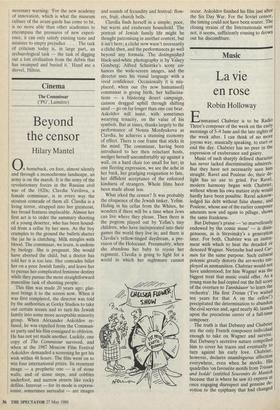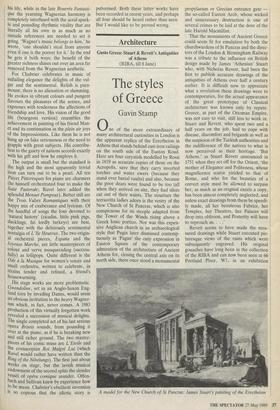Music
La vie en rose
Robin Holloway
Emmanuel Chabrier is to be Radio Three's composer of the week on the early mornings of 5-9 June and the late nights of the week after. I can think of no more joyous way, musically speaking, to start or end the day. Chabrier has no peer in the expression of exuberance and gaiety.
Music of such sharply defined character has never lacked discriminating admirers. But they have not necessarily seen him straight. Ravel and Poulenc do; their de- light has no axe to grind. For Ravel, modern harmony began with Chabrier, without whom his own mature style would hardly have been possible. Ravel acknow- ledged his debt without false shame, and Poulenc, whose use of the earlier composer amounts now and again to pillage, shows the same frankness.
But Debussy's praise — 'so marvellously endowed by the comic muse' — is disin- genuous, as is Stravinsky's a generation later. For both, Chabrier was an instru- ment with which to beat the dreaded or detested Wagner. Nietzsche had used Car- men for the same purpose. Such cultural polemic greatly distorts the art-works em- ployed as ammunition. Chabrier would not have understood; for him Wagner was the biggest treat that music could offer. As a young man he had copied out the full score of the overture to Tannhauser 'to learn the orchestra'. His first Tristan ('I've waited ten years for that A on the cellos!) precipitated the determination to abandon the civil service and, aged nearly 40, launch upon the precarious career of a full-time composer. The truth is that Debussy and Chabrier are the only French composers individual enough to take on Wagner and survive. But Debussy's secretive nature compelled him to cover his traces and eventually to turn against his early love. Chabrier, however, declares unambiguous affection everywhere, even when he mocks. His quadrilles 'on favourite motifs from Tristan and Isolde' (entitled Souvenirs de Munich because that is where he saw it) express at once engaging disrespect and
genuine de- votion to the epiphany that had changed his life, while in the late Bourree Fantasti- que the yearning Wagnerian harmony is completely interfused with the acrid spark- le and pounding rhythmic vitality that are literally all his own in as much as no outside references are needed to set it going. 'Wagner's music belongs to him,' he wrote, 'one shouldn't steal from anyone even if one is the poorer for it.' In the end he gets it both ways; the benefit of the greater richness shines out over an area far removed from the Wagnerian aesthetic.
For Chabrier celebrates in music of unfailing elegance the delights of the vul- gar and the sentimental. Relish is para- mount; there is no alienation or slumming. He evokes in vibrant colours and pungent flavours the pleasures of the senses, and expresses with tenderness the affections of friendship and love. His vision of the good life (bourgeois version) resembles the achievement in painting of his friend Man- et and its continuation in the plein air joys of the Impressionists. Like them he is not hung up on fake seriousness or the need to grapple with great subjects. His contribu- tion to the gaiety of nations accords exactly with his gift and how he employs it.
The output is small but the standard is the high and the most apparently trivial item can turn out to be a pearl. All ten Pieces Pittoresques for piano are charmers (he himself orchestrated four to make the Suite Pastorale; Ravel later added the splendid Menuet Pompeux). Better still are the Trois. Valses Romantiques with their happy mix of exuberance and lyricism. Of the handful of songs the four devoted to `natural history' (cicadas, little pink pigs, ducklings, fat lordly turkeys) are best, together with the deliriously sentimental nostalgia of L'Ile Heureux. The two origin- al orchestral pieces, Espana and the Joyeuse Marche, are little masterpieces of colour and verve masquerading (success- fully) as lollipops. Quite different is the Ode a la Musique for women's voices and small orchestra, written to celebrate, in strains tender and refined, a friend's housewarming.
His stage works are more problematic. Gwendoline, set in an Anglo-Saxon Eng- land torn by invading Danes, would seem an obvious invitation to the heavy Wagner- Ism which, in fact, never comes. A 1983 production of this virtually forgotten work revealed a succession of musical delights. The single completed act of his last serious opera Briseis sounds, from pounding it over at the piano, as if he is breaking new and still richer ground. The two master- pieces of his comic muse are L'Etoile and the cornucopian Roi Malgre Lui (which Ravel would rather have written than the Ring of the Nibelungs). The first just about works on stage, but the lavish musical endowment of the second splits the slender vessel of opera comique asunder. Offen- bach and Sullivan knew by experience how to be mean. Chabrier's ebullient invention is so copious that the idiotic story is pulverised. Both these latter works have been recorded in recent years, and perhaps all four should be heard rather than seen. But I would like to be proved wrong.



















































 Previous page
Previous page